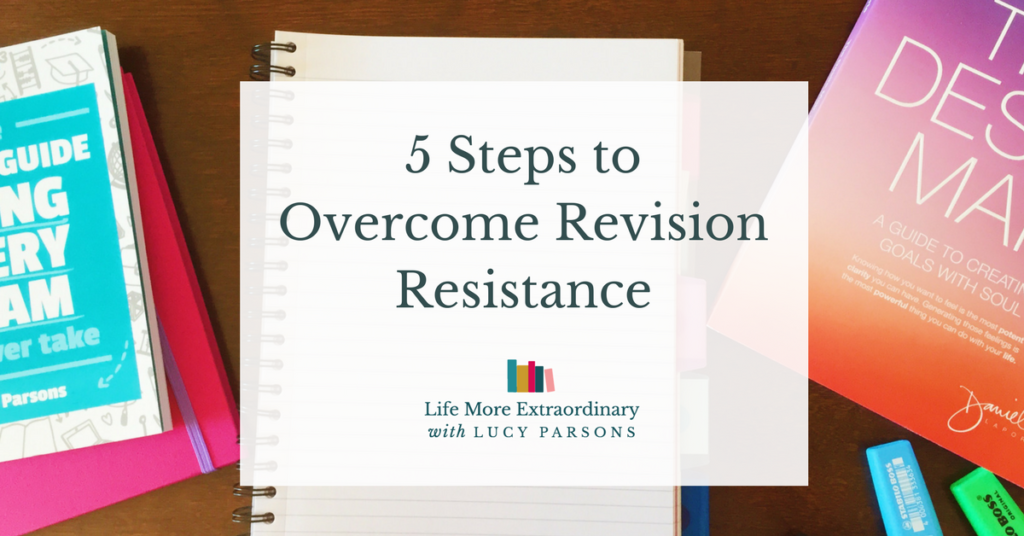5 Steps to Overcome Revision Resistance
 We all do it. Whether it's choosing the chocolate bar over the apple or watching a movie rather than going for a long walk, we choose the thing that's less good for us. We are resisting the things that we know will help us be the better version of ourselves.
We all do it. Whether it's choosing the chocolate bar over the apple or watching a movie rather than going for a long walk, we choose the thing that's less good for us. We are resisting the things that we know will help us be the better version of ourselves.
When it comes to revision, like me, I'm sure you've had very strong moments of resistance. Sometimes you just want to push the books aside, throw the past papers in the bin and do anything else. You feel like a prisoner of revision and you just want to break free.
Today I'm going to talk to you about how to overcome revision resistance. The ideas that I'm sharing here come from Danielle LaPorte's book, The Desire Map, and she learned them from a man called Todd Herman. Once your exams are over I highly recommend checking out The Desire Map – it's a great way to think about creating a deeply fulfilling life for yourself.
How to overcome revision resistance
1. Breathe
When you sense those feelings of resistance or outright rebellion inside your body stop and breathe. Breathe deeply. Go out for a walk and breathe. Do some yoga and breathe. Run as far as you can, as fast as you can and let go of all those pent up feelings.
If you allow yourself to release your feelings you will feel more free. With that renewed sense of freedom you'll have less resistance towards your revision.
2. Remember your ‘great big why'
In the first chapter of my book, The Ten Step Guide to Acing Every Exam You Ever Take, I guide you through a process to indentify your ‘great big why'. Your great big why is the reason why you're doing these exams. Clearly (unless you're a bit weird) you're not doing ten GCSEs or 4 A Levels and spending the beautiful spring months locked up inside revising for the fun of it. There is some grander reason. These exams are leading you somewhere and opening doors to future opportunity. That might be getting into your first-choice sixth form, studying at the university you dream of or having your dream lifestyle.
When you feel the resistance rising and are questioning the point of it all hold on to your great big why.
3. Remind yourself
Say these words to yourself, either out-loud or inside your own head:
“I'm changing.”
When I go to speak in schools I often talk about how I can physically feel the learning process happening inside my brain, and many students are able to recognise what I'm talking about. As I learn new stuff, particularly things that are difficult for me to understand, I push myself outside my comfort zone and feel the boundaries of what was previously possible for my brain expand.
Sometimes it almost hurts. It's always very tiring. But it's also exciting.
When you feel this happening, whisper to yourself, “I'm changing,” and feel the satisfaction of the hard work that you're doing paying off as the neurons in your brain re-align to store the knowledge that you've just conquered.
4. Rehearse your performance ahead of time
This can come in two parts for you as a student.
- Do your past paper practice. The more you practice how to answer the kinds of questions you're going to be asked in the exam, the more comfortable you're going to be with doing it. Revision Power Hours are the perfect way to do past paper practice.
- Visualise how you're going to behave before, during and after your exam. Actually rehearse it all in your mind. As you're lying in bed at night with your eyes closed play the movie of yourself going to the exam, standing outside the exam hall and breathing deeply, calmly smiling at your friends but staying internally focused on your goal. Then, see yourself going into the exam, laying out your pens and pencils, calmly reading the instructions on the front of the paper. Then see yourself as you carefully and methodically read through the questions, circling command words and planning out your answers. Finally, see yourself leaving the exam hall with your head held high and a modest smile on your lips.
The more often you visualise the way you want to be in your exam, the more likely it is to come true.
5. Keep drafting
When a book editor spots a mistake in a manuscript they don't send it back to the author and ask for a re-write. They simply correct the mistake and move on.
As you're revising you're on a journey of improvement. Every time you come back to a piece of knowledge you will recall it better and explain it more clearly than the time before. When you make mistakes, get things wrong or can't remember something don't get exasperated, just make a note of it and come back to it again sometime. It's part of the learning process.
Recognising that it's unreasonable to expect perfection of yourself is empowering. It gives you permission to work on yourself and improve.
Drop the resistance and keep going
At the end of the day, you have to decide whether your grades are important enough to you to keep going. What I want for you is to reach your full-potential so that you're not unnecessarily closing the doors of opportunity for yourself. But this doesn't mean that you need to punish yourself. Accept yourself for the perfectly imperfect person you are, give yourself time and space and have realistic expectations of yourself. But, ultimately, just keep on moving forwards.
